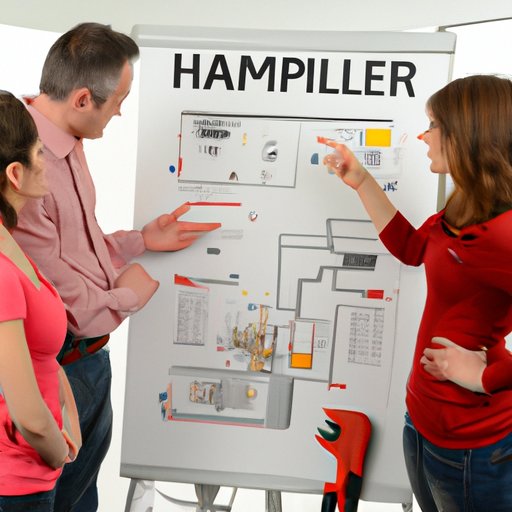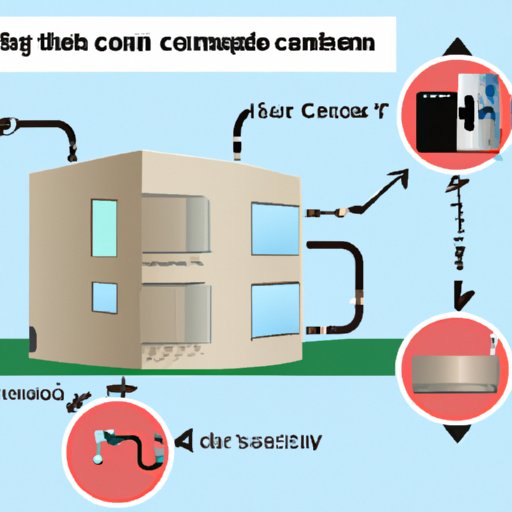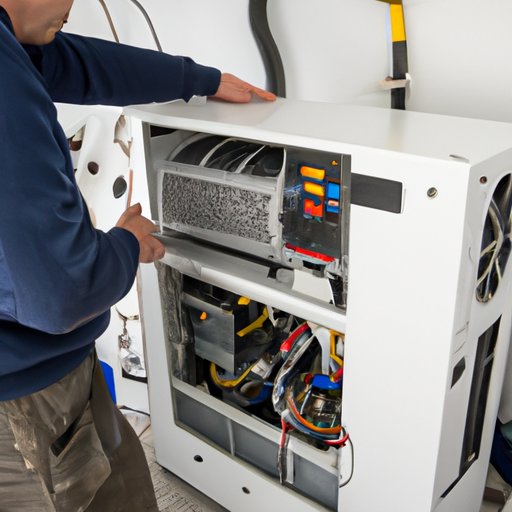Introduction
A heat pump is an energy-efficient device that uses electricity to transfer heat from one location to another. It works by absorbing heat from the outside air, ground, or water and then transferring it inside your home. Heat pumps are becoming increasingly popular as a way to reduce energy costs and provide a comfortable living environment. In this article, we will explore what a heat pump is, how it works, its benefits, installation process, and its components and functions.

Explaining the Basics of Heat Pumps: What They Are and How They Work
A heat pump is an electrically powered device used to transfer heat from one place to another. Heat pumps work by using a refrigerant to absorb heat from the outside air, ground, or water and then transferring it inside your home. The heat pump has two parts—an outdoor unit and an indoor unit. The outdoor unit absorbs the heat and transfers it to the indoor unit, where it is released into your home.
Heat pumps come in two types: air-source and ground-source. Air-source heat pumps absorb heat from the outside air and transfer it inside your home. Ground-source heat pumps, on the other hand, absorb heat from the ground and transfer it inside. Both types of heat pumps can be used for both heating and cooling purposes, making them a versatile and energy-efficient option for home comfort.

A Comprehensive Guide to Heat Pumps: Understanding Their Benefits and Installation Process
Heat pumps offer many advantages over traditional heating and cooling systems. For starters, they are much more energy-efficient than traditional systems, as they require less energy to operate. Additionally, heat pumps can help reduce energy costs by up to 30%, depending on the type of system and the climate in which it is installed. Heat pumps also provide a more comfortable living environment, as they distribute air evenly throughout the home.
When choosing a heat pump, there are several factors to consider. These include the size of your home, the climate in which you live, the type of heat pump you need (air-source or ground-source), and the amount of energy efficiency you want. Additionally, you should consider the cost of installation, as well as the potential energy savings associated with the system.
Once you have chosen the right heat pump for your home, the next step is to install it. Installing a heat pump can be a complicated process, so it is important to hire a qualified professional who can do the job correctly. The installation process typically involves drilling holes in the walls of your home, connecting the outdoor and indoor units, and testing the system to ensure it is functioning properly.
Heat Pumps: A Cost-Effective Solution for Heating and Cooling Your Home
Heat pumps are a cost-effective option for heating and cooling your home. By using a heat pump, you can save money on your energy bills and enjoy a more comfortable living environment. According to the U.S. Department of Energy, heat pumps can reduce energy use by up to 40% compared to traditional heating and cooling systems.
In addition to energy savings, heat pumps also require less maintenance than traditional systems. Since they don’t require any fuel to operate, there is no need to purchase fuel or dispose of waste products. Additionally, heat pumps require fewer repairs, as they don’t have any moving parts. As a result, they can last up to 20 years or more.
To ensure your heat pump runs as efficiently as possible, it is important to perform regular maintenance. This includes checking the filters, cleaning the coils, and inspecting the system for any signs of wear or damage. Additionally, it is important to check the refrigerant levels and make sure the system is running at its optimal efficiency.
Heat Pump Technology: An Overview of Its Components and Functions
Heat pumps are composed of several components that work together to transfer heat from one place to another. These components include the compressor, evaporator coil, condenser coil, fan, and expansion valve. The compressor is responsible for compressing the refrigerant, while the evaporator and condenser coils are responsible for absorbing and releasing heat, respectively. The fan helps circulate the air, and the expansion valve regulates the flow of the refrigerant. Together, these components work to transfer heat from the outside air, ground, or water and release it into your home.
The compressor is the heart of the heat pump system and plays an essential role in its performance. The compressor is responsible for compressing the refrigerant, which causes it to become hot and release heat. This heat is then transferred to the indoor unit, where it is released into your home.
The Pros and Cons of Heat Pumps: Is It Right for You?
Heat pumps offer many advantages, including energy efficiency, cost savings, and a more comfortable living environment. However, they also have some drawbacks, such as high upfront costs and potential noise issues. To determine if a heat pump is right for you, it is important to weigh the advantages and disadvantages and decide if the potential benefits outweigh the potential drawbacks.
On the plus side, heat pumps are much more energy-efficient than traditional heating and cooling systems, and can help reduce energy costs by up to 30%. Additionally, they require less maintenance and can last up to 20 years or more. On the downside, heat pumps can be noisy, and the installation process can be complex and expensive.
Ultimately, whether or not a heat pump is right for you depends on a variety of factors, including your budget, the size of your home, and the climate in which you live. If you decide that a heat pump is the best option for you, it is important to choose the right system and hire a qualified professional to install it.
Conclusion
Heat pumps are becoming increasingly popular as a way to reduce energy costs and provide a comfortable living environment. They are much more energy-efficient than traditional heating and cooling systems and can help reduce energy bills by up to 30%. Heat pumps also require less maintenance and can last up to 20 years or more. However, they can be noisy and the installation process can be complex and expensive.
When deciding whether or not a heat pump is right for you, it is important to weigh the potential benefits and drawbacks. Ultimately, the decision will depend on your budget, the size of your home, and the climate in which you live. If you decide that a heat pump is the best option for you, it is important to choose the right system and hire a qualified professional to install it.
(Note: Is this article not meeting your expectations? Do you have knowledge or insights to share? Unlock new opportunities and expand your reach by joining our authors team. Click Registration to join us and share your expertise with our readers.)
